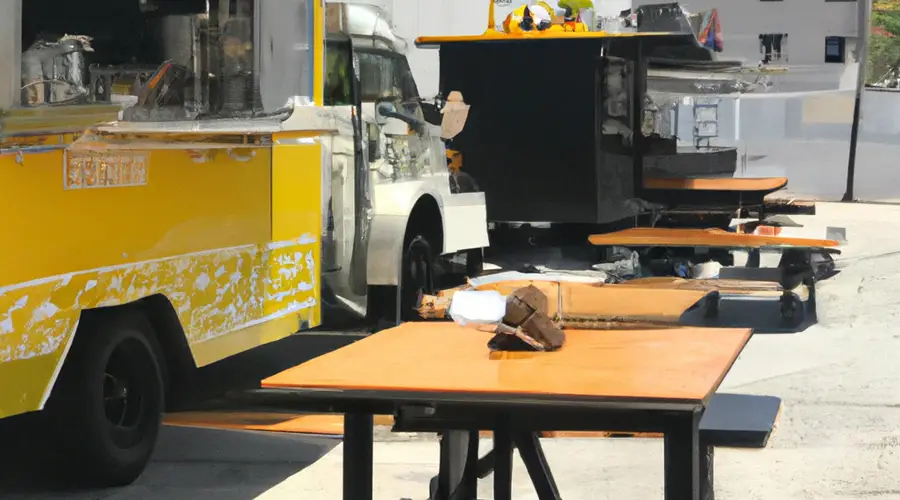The Business of Food Trucks in Miami
Food trucks have turned into a favorable option for people in Miami to start a business in the food sector who are aspiring entrepreneurs. With the rising number of food trucks in the market food trucks that were made for use mobile is now a great way for people who want to start a restaurant at a low cost first. They can use this business model to do this. Additionally, they can adapt their operations in case of a shortage of funds which is impossible for a brick-and-mortar restaurant. In this article, we will discuss the advantages, disadvantages, and challenges of the food truck business in Miami.
Food trucks were first existing, in fact, they have become more popular in recent times and one of the reasons behind the growth of street food culture and the needs of different unique and high-quality food sources. Miami is well-known for its great diversity in food and a lively culture. This is the perfect place where food truck newcomers can start their businesses. Because of the pleasant climate and the great number of open-air events Miami provides many food trucks with the opportunity to grow.
Advantages of the Food Truck Business in Miami
- Mobility and flexibility: Food trucks are mobile that they take advantage of the fact that they can be transported to several locations and events. This benefits companies that can target the areas they want to and increase their reach. Also, food trucks offer greater adaptability as compared to traditional restaurants with respect to demand and weather conditions.
- “Lower startup costs:” Precisely, food truck business is the one that is operated in a way that requires fewer costs in the beginning than the one associated with traditional restaurant opening. Entrepreneurs could save money by not paying for either rent or utilities, or many other fixed costs, and then they can invest more in the production of high-quality ingredients. They might also do things like acquiring more-up-to-date equipment and likely need less labor.
- Variety of events: Food trucks are visible in a variety of events that range from music festivals to food fiests alike. This allows them to touch base with a wider and more diverse audience, and draw in diverse customers.
- Customer loyalty: Food Trucks that create an atmosphere where customers feel friendly and special and serve their food throughout the whole process, would generate customer loyalty. If the customer feels that the brand has been tailored and stands out, they may be more engaged and loyal to it.
Disadvantages of the Food Truck Business in Miami
- Regulations and restrictions: The market for food trucks and the regard to food trucks are subjected to regulations imposed by the city and state, which might differ from one place to another. These rules can be so strict that they confine the zones where food trucks can be placed and limit the variety of food they can sell.
- Weather conditions: The good weather of Miami that in one side gives many possibilities of outdoor events and the all-year-round market in the other side makes the operating of the food trucks difficult when it bot hot and humid during summer time.
- Limited space and storage: With food trucks being limited by space and storage capacity, it can often be a challenge when preparing and storing ingredients and equipment. The founders of new businesses should be creative to get the best results with the available space and to store their products in the most effective way.
- Competition: The food trucks in Miami have become more and more popular. For example, there are more entrepreneurs who have attempted the competition of selling their food from trucks. They must think about getting food of the highest quality for a new food truck.
Characteristics of the Food Truck Business in Miami
- Menu innovation: Regarding the food trucks in Miami, who are known for the innovative and unorthodox menus on offer. The foods featured are however not limited to just one cuisine or being the same dishes one can find elsewhere. Entrepreneurs, in the meantime, can innovate by experimenting with the new foods, flavors, and adding the capabilities for customers changing preferences.
- Branding and design: The branding and design are crucial components in the food business as they contribute greatly to forming a memorable and recognizable brand. Entrepreneurs can use visual and colorful designs and logos to attract customers and distinguish themselves from the competition.
- Customer engagement: Food trucks that are run by people can interact with their customers through social media, promos, and events. In addition, they can make it a sunny and generous corner of their truck, offering personal service to the customers through the food and the people responsible for it, consequently giving them an incomparable experience.
Marketing for the Food Truck Business in Miami
Marketing is a crucial part of food truck business and marketing in Miami is no exception.
- Social media: Social media platforms such as Instagram, Facebook, and Twitter are powerful tools for a food truck’s marketing. Business owners can upload photos of their food and truck, as well as share their location and schedule, and they can approach their customers through both comments and messages.
- Events and collaborations: With the help of food truck entrepreneurs entering the market and the wide variety of events, it’s a great idea to collaborate with other businesses or take part in the events to increase your customer reach. They can also organize their events, for example, pop-up dinners or food festivals, to showcase their food and brand.
- Loyalty programs: Service providers will have an opportunity to build a loyal customer base by giving out reward points and reducing prices on staple items to the consumers that buy the most.
- Online ordering and delivery: Food trucks can adopt online ordering and delivery options to not only attract new customers who might not be able to visit the truck but to also be more inclusive with the customer base by extending the geographical reach using this method.
Besides this, email marketing to reach out to customers to let them know about specials and events is another method that entrepreneurs can think about. They can also join hands with influencers or local media outlets to strengthen their presence in the market. Another viable strategy is to attend community events and charities to build a positive image and relationships with the local community. Through the use of multiple marketing strategies, food truck owners can spread the word about their business and make their business known and appreciated by the community.
Best location for a food truck business in Miami
Selecting the perfect spot for a food truck to kick off a business is a crucial factor for it to set in Miami. Here are crucial factors to consider in finding the right spot for the food truck:
- Foot traffic: One of the things to check out where we want to operate our truck is foot traffic, this is, to say, check out the streets or the nearby parks and venues which are always crowded with people. This is in pursuit of gaining more visibility and subsequently drawing in more customers to the food truck.
- Demographics: For identification and planning for the particular area, we should have an idea of the demographics like the average age, income, and lifestyle. This way, we can make sure that the food truck concept and menu we develop are aligned with the consumer wants and needs in that particular area.
- Competition: Find out the food truck and restaurant infrastructure the market has already in stock and distinguish those who may be the possible competition. As a company, make sure that we don’t blend and the community already has the same organization we intend to set at the claimed market or it has no worthy ads to offer that we will. One must then scout out such problematic locations.
- Permits and regulations: Look into the local government bodies such as Miami-Dade who will be responsible for the monitoring of food trucks and everything else. Moreover, obtaining the approval of the local authorities does not mean that all infrastructure to run the food business is in place. One of the most important documents you should take to the health department is the business plan. You can easily attach a map or any other inventory document to your existing business plan as long as it has a proper description on the back so that everything will be understood
- Accessibility: Zero in on a place that has good accessibility and is also equipped with ample parking facilities and high-quality public transportation services in order to grab a diverse population of customers.
- Cost: Include the expense of renting or leasing space, as well as the cost of other utilities, insurance, and tax, to consider that the business can be both viable and be a profit maker.
By virtue of carefully contemplating these variables, the food truck proprietors in Miami are in a position to scout for the ultimate location, luck their business out and thereby raise their chances of success.
The food truck enterprise in Miami, with its growing economic strength and maturing hobbyist and advocate base, presents diverse challenges and opportunities for entrepreneurs. The idea of mobile food businesses, which are not tied to any one location and are capable of moving in many directions and the reduced initial costs of setting up these kind of businesses, along with a wide range of events organized, are the attractions of the mobile food selling business. On the other hand, pedestrians can also be busy or they might be consuming something they bought from a mobile food vendor, which is, as it can be, a bit challenging. The acceptable procedures may be related to mobile food vending which also follows the same line of thought. Meanwhile, the demand for healthy food stalls is growing, along with the implementation of city policies that facilitate the establishment of a food truck. Conversely, food trucks are also highly likely to fueling the overall market and can claim to be part of the solutions to food deserts. Ultimately, food trucking marketplace helps city-dwellers enjoy the cities mainly by bringing a variety of products and options through the walk-by purchasing model.



